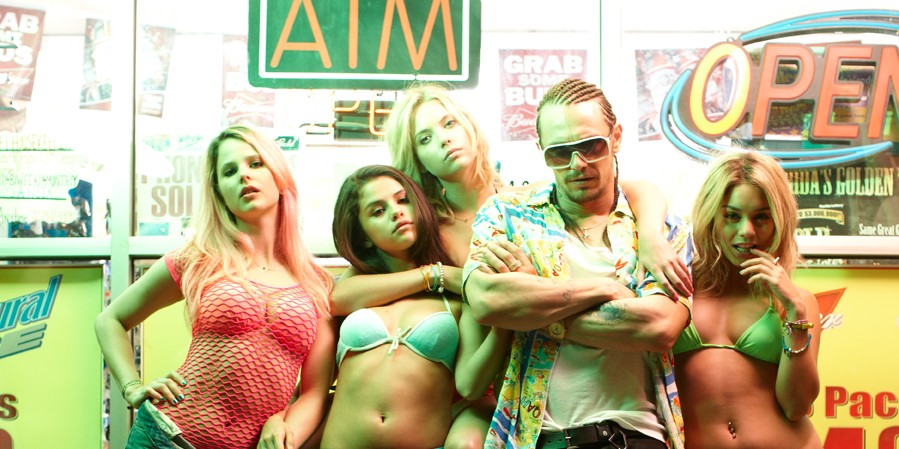Last year’s James Franco–curated “Rebel” show at the Joel Cohen/MOCA space included a collaboration between Hollywood’s polymathic heartthrob and indie enfant terrible Harmony Korine, in the form of a video entitled CAPUT. The rooftop rumble between bare-naked gang ladies wielding machetes and BMX bikes was one of the installations that sought to deconstruct Rebel Without a Cause and the movie’s camp, tabloid and mythical dimensions. Korines’ latest film, Spring Breakers, also features Franco and it too inhabits the interstitial psychic space between movie and art. Known for creating semi-abstract subcultural anthropologies, beginning with the Larry Clark collaboration Kids, Korine has stated he considers narrative film as a medium to be basically unchanged since the days of D.W. Griffith. With Spring Breakers he demonstrates that it can still be an experimental form, in this case a dubstep-fueled melodrama which is both self-referential and heartfelt. On the surface this is his most conventional, or at least narrative, film. The plot has to do with four college girls, including über–tweeny-boppers Vanessa Hudgens and Selena Gomez, as pussy-riot-grrls on a nihilist spring-break bender. When they hook up with Franco’s white-trash gangsta rapper they become rebels with even less of a cause than erstwhile Hollywood antecedents like, say, the kids from Natural Born Killers. But amid the beer-bong bacchanalia Korine is really crossbreeding genre conventions with video idioms and self-reflexive cultural camp to produce a sort of pop-infused avant-garde sexploitation flick: a legitimate art movie. We asked him about it as he began the press tour in Beverly Hills.
Artillery: Are you a big spring breaker?
Harmony Korine: Actually I never went, but growing up in the South everybody did, we called it the Redneck Riviera. For a long time I had been collecting spring break imagery and photographs, you know—girls pissing in golf carts and, like, people setting houses on fire and passing out on kegs in the ocean. I had thousands of these and I started dreaming up this story. The first image that came into my mind was of a girl on a white beach in a bikini during spring break with a pink ski mask holding a gun. It was like ‘How would that happen?’ And I started thinking of these girls coming from out of town and robbing tourists on the beach. And I thought of some people and characters and things that I had been cataloging and I just invented this kind of strange beach nightmare.
Thematically the film is kind of a Scarface on acid, but you also operate on the language of film; the repetitive slow motion, the exaggerated melodrama. Was that important?
Yes, hugely. I see films differently, I always have seen film differently and with this movie I wanted to make something that was more of an experience, more like a feeling—something that was experiential, almost like in electronic music or in trance music there’s this lulling sense, almost like a drugged-out effect. I never understood why directors don’t play more with the medium, because film’s possibilities are really endless. And so with this movie it was very much about a specific style of filmmaking, a feeling I wanted more than any type of articulation, I wanted the movie to work in a physical way, for it to go through you, to almost batter you, like it’s a barrage or an attack.
Some people would say that kind of visceral effect is the purview of video art? Do you think it’s still meaningful to make films?
It doesn’t bother me whatever you call it anymore—it is what it is. I’m just trying to create a mood and a feeling and something that is transcendent and powerful and it doesn’t bother me where you show it or how it’s seen or what you call it. I’m not concerned anymore how people watch things or where they watch. I just set out to make the most perfect thing I can make and put it out in the world and I guess just walk away and hope for the best.
Define “thing.”
I’m not making films necessarily in the traditional sense, I don’t care about a perfect logic. It’s like the real world, except pushed in something more “hyper.”
Werner Herzog has said your movies may not conquer worldwide cinema but so what?
Yeah, but I think this one is different from a lot of the other stuff I’ve done. I view it as kind of a slight step into the mainstream—know what I mean? Kind of more “pop”…
Your blockbuster?
Blockbuster! Yeah!
Above: Bad girls with bikinis and Franco, courtesy of A24


